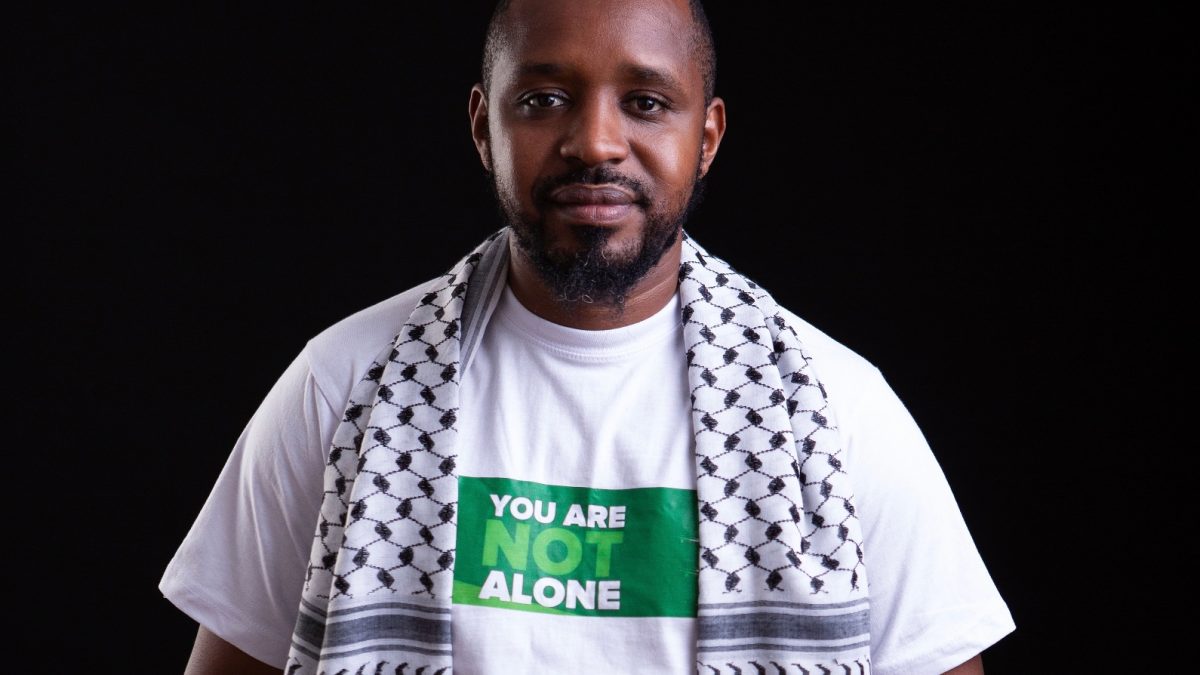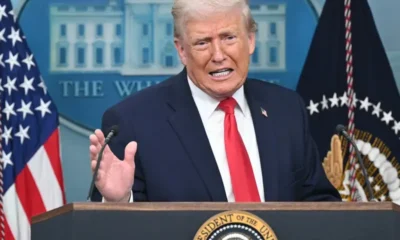News
Boniface Mwangi Detained At Pangani Police Station As Police Investigate Alleged Involvement in Planning and Financing June 25 Chaos

Activist’s arrest sparks controversy as lawyers question legality of warrant while authorities probe terrorism-related charges
Renowned activist Boniface Mwangi was arrested on Saturday evening and is currently being held at Pangani Police Station, where he awaits a court appearance scheduled for Monday morning.
The detention comes amid a sweeping police investigation into his alleged involvement in planning and financing the nationwide protests that occurred on June 25, 2025.
The dramatic arrest unfolded at Mwangi’s residence in Lukenya, Machakos County, where officers from the Directorate of Criminal Investigations conducted simultaneous raids at his home and his Mageuzi Hub offices located at Metropolitan Court on Argwings Kodhek Road in Hurlingham.
His wife, Njeri Mwangi, confirmed the arrest through social media, expressing distress as she watched police take away her husband’s electronic devices.
“The police have come to our home, Courage Base, and are taking my husband, alleging terrorism and arson. They’ve taken his gadgets and said they’re taking him to DCI Headquarters. I can’t breathe,” she posted on social media platform X, capturing the anxiety that would grip the activist community for hours.
The charges being investigated paint a serious picture of alleged criminal activity.
According to a search warrant issued by the Milimani Magistrate’s Court on July 17 seen by Kenya Insights, authorities are probing offences including damage to property, incitement to violence, arson, robbery with violence, and money laundering.
The warrant, sworn by DCI officer Keith Robert, specifically alleges that Mwangi was involved in planning and financing the June 25 protests that swept across the country.
Intelligence
The investigation stems from what the DCI describes as “an intelligence report from a reliable source” indicating that occupants of the Mageuzi Hub offices were involved in the planning, procurement of resources, execution, or issuance of commands related to the countrywide protests.
This intelligence has prompted authorities to scrutinize Mwangi’s financial activities and communications, leading to the seizure of his electronic devices, documents, and other materials.
However, the arrest has immediately drawn sharp criticism from Mwangi’s legal team, who are challenging both the legitimacy of the warrant and the manner of the arrest.
Lawyer Ndegwa Njiru, who was present during the operation, raised serious concerns about the court order’s validity, pointing out fundamental legal flaws that could undermine the entire investigation.
“Ordinarily, a court order must clearly state the name and rank of the magistrate who issued it,” Njiru told media outlets.
“But in this case, the order is simply signed ‘the magistrate,’ without any identifying details, which is highly irregular and legally questionable.”
This deficiency in the warrant could prove crucial in determining the admissibility of any evidence gathered during the search.
The legal complications extend beyond the warrant’s identification issues.
According to Njiru, the court order only authorized a search of Mwangi’s office premises, not his residential home, yet police conducted extensive searches at both locations.
Lawyer James Wanjeri further noted that officers seized electronics and personal property from the residence, actions that fell outside the scope of what the defective warrant permitted.
Adding to the controversy surrounding the arrest was the initial confusion about Mwangi’s whereabouts.
For several hours after the operation, his lawyers and family reported being unable to locate him, despite being told he was being taken to DCI headquarters.
The uncertainty raised serious concerns about his safety and the transparency of the detention process, until Vocal Africa Executive Director Hussein Khalid confirmed late Saturday evening that Mwangi was being held at Pangani Police Station.
The arrest comes at a particularly sensitive time for Mwangi, who had just filed a significant case at the East African Court of Justice on Friday alongside his Ugandan colleague Agather Atuhaire.
The duo is seeking Sh130 million each from the Tanzanian government for alleged human rights violations, including enforced disappearance, torture, arbitrary detention, sexual abuse, and unlawful deportation that they claim to have experienced while in Tanzanian custody.
Condemnations
Political leaders and civil society activists have rallied to condemn the arrest, viewing it as part of a broader campaign of intimidation against human rights defenders.
People’s Liberation Party Leader Martha Karua expressed outrage at what she termed a “campaign of intimidation and harassment,” questioning why the government would “openly walk with militias but arrest law-abiding citizens.”
Her statement reflects growing concerns within activist circles about the space for dissent and peaceful protest in Kenya.
Senior Counsel Paul Muite raised procedural questions about the timing and manner of the arrest, noting the unusual decision to conduct such an operation on a Saturday.
His concerns about constitutional compliance echo broader worries about the rule of law and proper legal procedures being followed in politically sensitive cases.
Hussein Khalid of Vocal Africa offered a character defense of Mwangi, stating emphatically that he has known the activist “for many, many years” and can say “without a shred of doubt that he is neither a terrorist nor an arsonist.”
Khalid characterized the arrest as “nothing but pure intimidation” that would ultimately prove ineffective in silencing civil society voices.
The June 25 protests that form the basis of the current investigation were part of a wave of demonstrations that have periodically swept Kenya in recent years, often centered on issues of governance, corruption, and economic hardship.
These protests have become a significant feature of Kenya’s political landscape, with activists like Mwangi playing prominent roles in organizing and participating in peaceful demonstrations.
Mwangi’s legal team has already indicated their intention to challenge not only the charges but also the fundamental legality of the arrest and the procedures followed during the search and seizure operations.
The defective warrant and the apparent overreach in searching locations not covered by the court order provide strong grounds for such a challenge.
The case highlights ongoing tensions between Kenya’s security apparatus and civil society organizations, particularly those involved in organizing or supporting public demonstrations.
The serious nature of the charges, including terrorism and money laundering, reflects the government’s increasingly robust response to protest activities, though critics argue this represents an escalation that threatens democratic freedoms.
Kenya Insights allows guest blogging, if you want to be published on Kenya’s most authoritative and accurate blog, have an expose, news TIPS, story angles, human interest stories, drop us an email on [email protected] or via Telegram
-

 Americas6 days ago
Americas6 days agoEpstein Files: Bill Clinton and George Bush Accused Of Raping A Boy In A Yacht Of ‘Ritualistic Sacrifice’
-

 Business1 week ago
Business1 week agoCooking Fuel Firm Koko Collapses After Govt Blocks Sh23bn Carbon Deal
-

 Business6 days ago
Business6 days agoABSA BANK IN CRISIS: How Internal Rot and Client Betrayals Have Exposed Kenya’s Banking Giant
-

 Business3 days ago
Business3 days agoKRA Can Now Tax Unexplained Bank Deposits
-

 Investigations1 week ago
Investigations1 week agoPaul Ndung’u Sues SportPesa for Sh348 Million in UK Court, Accuses Safaricom Boss of Sh2.3 Billion Conspiracy
-

 Investigations2 days ago
Investigations2 days agoEpstein Files: Sultan bin Sulayem Bragged on His Closeness to President Uhuru Then His Firm DP World Controversially Won Port Construction in Kenya, Tanzania
-

 Americas6 days ago
Americas6 days agoEpstein Files: Trump Accused of Auctioning Underage Girls, Measuring Genitals and Murder
-

 News4 days ago
News4 days agoAUDIT EXPOSES INEQUALITY IN STAREHE SCHOOLS: PARENTS BLED DRY AS FEES HIT Sh300,000 AGAINST Sh67,244 CAP
















